Upskilling is a hot topic in recruiting because it can provide a notable competitive advantage for business process outsourcing (BPO) and customer experience providers that rely on many entry-level employees to deliver top-notch service.
Delivering a positive experience to today’s always-on, tech-savvy consumer means your organization will need to continuously improve support quality to compete. That’s why it’s more important than ever to invest in your agents and to support their professional growth and skill development while delighting your customers.
Here’s how to upskill your BPO or contact center workforce for future success, to maintain your competitive advantage and delight your clients:
What’s in?
Like what you see?
Don’t miss out. Subscribe to our quarterly digest to get the latest TA and TM resources delivered right to your inbox.
What does it mean to “upskill” someone?
Upskilling is the process of training and developing employees to help improve performance in their current roles, and can be incredibly beneficial for organizations of all shapes and sizes, especially BPO and contact centers where employees’ daily tasks are relatively routine, and therefore, easy to isolate and develop training for.
Finding ways to upskill both in-person and remote workers is essential for achieving success in today’s ever-evolving, technology-driven climate, especially as best practices and channels for support continue to evolve.
Upskilling your contact center’s workforce can benefit your organization by better equipping you to:
- Handle new support types – Nothing is set in stone. Just because you hire an employee to do a certain job, it doesn’t mean they’ll never be well suited for another. With a solid upskilling and internal mobility strategy in place, phone support agents can become live chat support agents (and vice versa), learn to handle calls across various industries, move into management roles, and so on.
- Retain more employees – High turnover proves a top challenge for BPO and contact centers time and time again. By investing in your employees’ growth and finding ways to upskill your workforce, you can also improve your retention and save on recruiting costs due to ill-fitting hires who leave before even reaching their full productivity. Plus, it helps show your employees that you want them to succeed and can boost morale.
- Work more efficiently – Closing talent gaps is an excellent way to streamline internal processes and work more efficiently. Building on your current workforce’s skills will help you identify talent gaps, determine the best way to fill those gaps and prevent unnecessary business delays that impede productivity.
- Improve service quality – When your company is no longer lacking in key skill areas, the quality of your BPO services is likely to improve, helping you to boost productivity and potentially even win more business. An up-skilled workforce will be able to meet and exceed customer demands, regardless of how dramatically business changes and evolves over time.
- Close critical skills gaps – Bridging the talent gap will not only help your team work more efficiently, but also position your company for success in the long-haul. Rather than rushing out to fill each skills gap with an external candidate, you can focus on upskilling your current workforce and delivering even better service for your clients.
How can you upskill your BPO workforce?
1. Conduct a comprehensive talent gap analysis
According to a McKinsey Global Survey on future workforce needs, nearly nine in ten executives say their organizations either face talent gaps already, or expect gaps to develop within the next five years. Fortunately, a talent gap or skills gap analysis is a very useful exercise you can use to determine what gaps exist and how to close them.
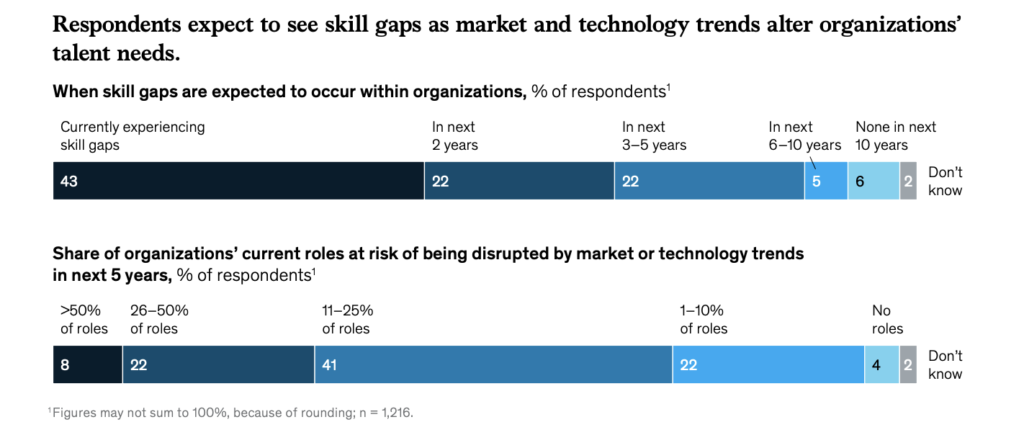
Conducting a comprehensive talent gap analysis can help you better understand your organization’s goals, identify trends in customer support (i.e. growth of live chat support) and the future of work and employment trends. Learning about the skills you currently have and the ones you still need to meet your company’s current and future goals is a crucial step to bridging the talent gap and positioning your organization for success.
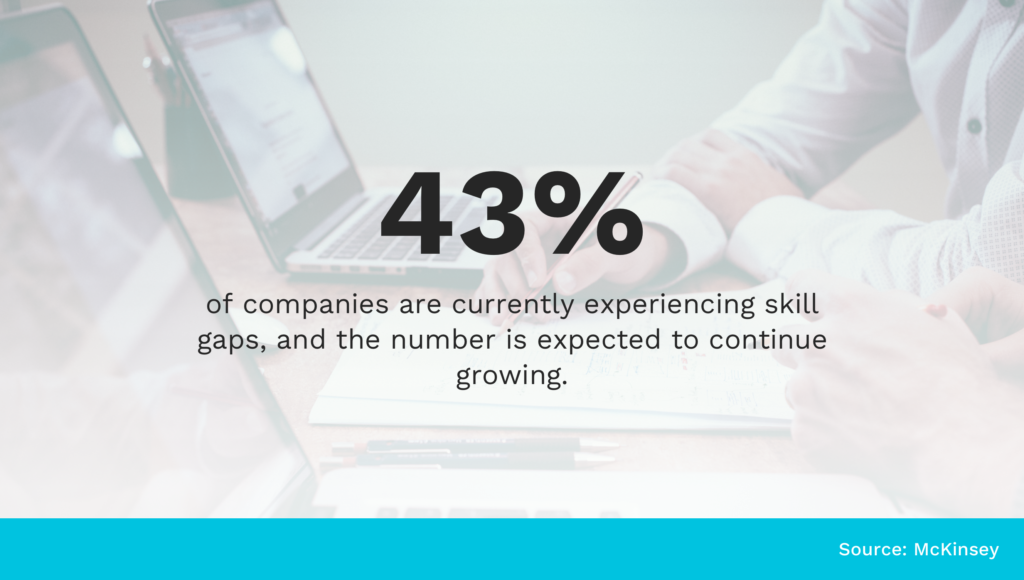
2. Rethink your recruitment strategy and process
The recruitment strategy and processes you’ve had in place for a while now simply may not cut it any longer—especially as your company grows and consumer needs evolve. If you’re looking to upskill your existing BPO workforce to fill talent gaps and offer better service to your customers, you’ll also need to reimagine your approach to recruiting.
Ask yourself: Do you have what it takes to attract, select and hire talent with the skills that you need? For example, if you’re looking for talent with niche technical skills, you will probably want to talk to the members of their potential team about the specifics of the job and may wish to include a peer interview in your process. You should also review your organization’s sourcing and selection process to ensure you’re finding, attracting, and ultimately hiring high-quality contact center staff with the right skills from the jump.
Hire better live chat agents, at scale.
Dive into the rise of live chat, the skills of top-performing agents, and how to best assess them to reduce attrition and guarantee top-notch customer service.

3. Use a realistic job preview or job simulation
Customer service work can be tough, and it’s imperative your candidates know what they’re getting into before they accept a role with your company. However, assessing soft skills and competencies and clueing candidates in on what to expect before accepting a role is quite challenging during a traditional application process.
Realistic job previews and contact center simulation tests are effective ways to assess and prepare job candidates for the responsibilities and challenges of the role in question. After a job preview and/or simulation test to prepare them for what to expect, job candidates are likely to be much more receptive to the challenges of the role—not to mention more receptive to learning how to improve their skills to overcome them.
Experience our best-in-class Live Chat Assessment first-hand!
Perfect for remote hiring, our live chat assessment makes it easier than ever to hire live chat agents. Candidates experience the job, while you get actionable data to drive hiring decisions.
4. Don’t hire and train all agent types the same way
Of course, you want to provide a consistent experience for new hires—that goes without saying. That said, you should still tailor your candidate selection and new hire training to be as relevant as possible to the job they’ll be doing, as well as to the individual’s strengths and limitations. One size won’t always fit all, and that’s perfectly fine!
For example, when hiring and training phone support agents, you’ll want to focus on excellent spoken language skills and the ability to deal with difficult customers at the moment. Whereas when hiring live chat support agents, you should measure their reading comprehension and writing skills, and train them on how to prioritize different chats which might be coming in at the same time.
Additionally, consider offering a blended training program using various techniques to accommodate different learning styles and position each new hire for success.
5. Start with your biggest skill gaps
Once you’ve learned through your talent gap analysis which skills are missing at your organization, you can begin looking for ways to reskill and upskill your existing BPO workforce. You may want to start with the fundamentals, like improving your training for new recruits to consistently boost the starting quality of new hires and improve their time to full productivity on the job.
Or, if you see higher-level skill gaps in your existing workforce, you may want to invest in hiring a trainer, setting up a seminar, or providing an online course to your candidates and compensating them for their participation. Your employees will appreciate the opportunity to grow and expand their skill sets, while your customers benefit from better service and your business is positioned for long-term success.
6. Put a mentoring program in place
Take a look at your existing workforce: Do you have the people in place to deploy and manage a mentoring program? More experienced employees with a lot of industry and company knowledge can teach junior team members and help them improve their skills.
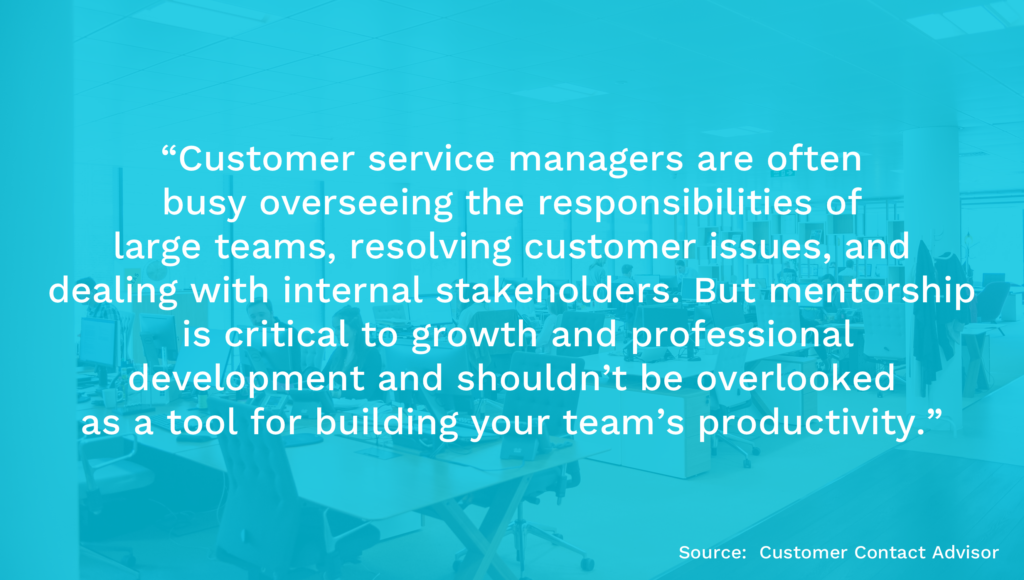
Launching a mentor program will help you upskill and reskill your in-house talent by making smart use of existing resources to hire the most qualified candidates possible. This way, you can ensure seamless knowledge transfer and continuity within your organization, offer employees attractive career development opportunities, gain a competitive edge in the industry and ultimately reduce employee turnover.
7. Foster a culture of learning
Another excellent way to upskill your BPO or contact center’s workforce is to begin fostering a company culture that encourages (and maybe even incentivizes) lifelong learning. Promote training programs, communicate opportunities, and make clear your commitment to nurturing your employees and supporting their growth.
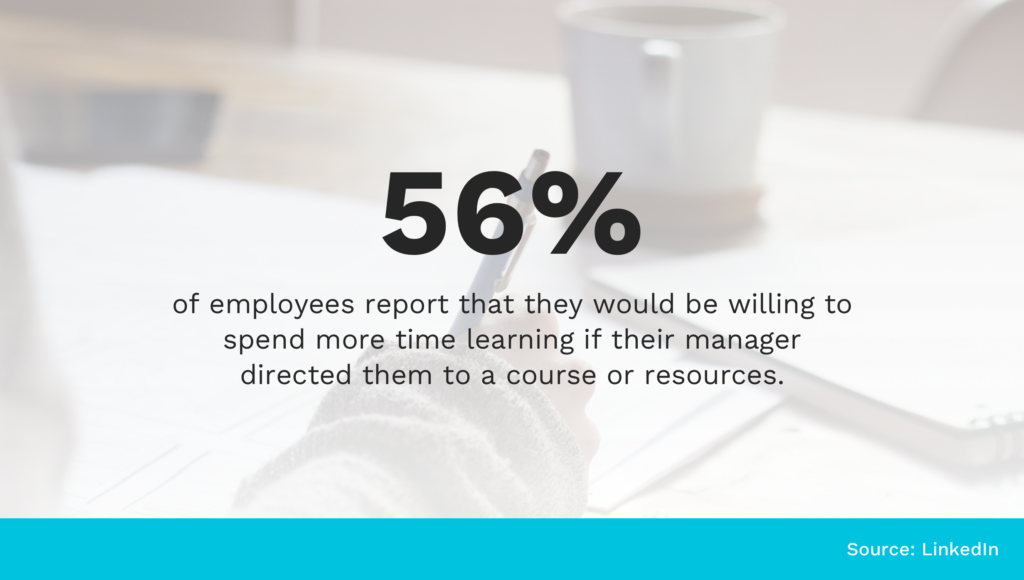
Building a curious culture of lifelong learners is essential amid changing business environments. Employees who embrace lifelong learning by continually increasing their knowledge, skills, and competencies are more likely to thrive, demonstrate loyalty and longevity and remain a vital part of their organization.
8. Develop an internal mobility strategy
There are a lot of talented people at your organization already and they could be interested in stepping up, learning new skills, and taking on more responsibility. You need to enable them to do so by developing a solid internal mobility strategy that empowers agents to stick with your company and grow their skills over time.
As part of your recruitment strategy, make it a point to focus on both vertical and horizontal mobility. That means you should not only look to promote people, but also identify agents who might have the right skills to work on a more challenging client or provide another type of support. After all, you never know if a mid-performing phone agent could be a star at live chat with the right training or vice versa.
9. Conduct data-driven performance management
If you can’t track the performance of your agents, then it will be difficult to tell if your recruiting and training efforts have been successful. Conducting thorough, data-driven performance management exercises will arm you with helpful insights on the effectiveness of your contact center’s hiring, onboarding and training processes so you can optimize and improve them.
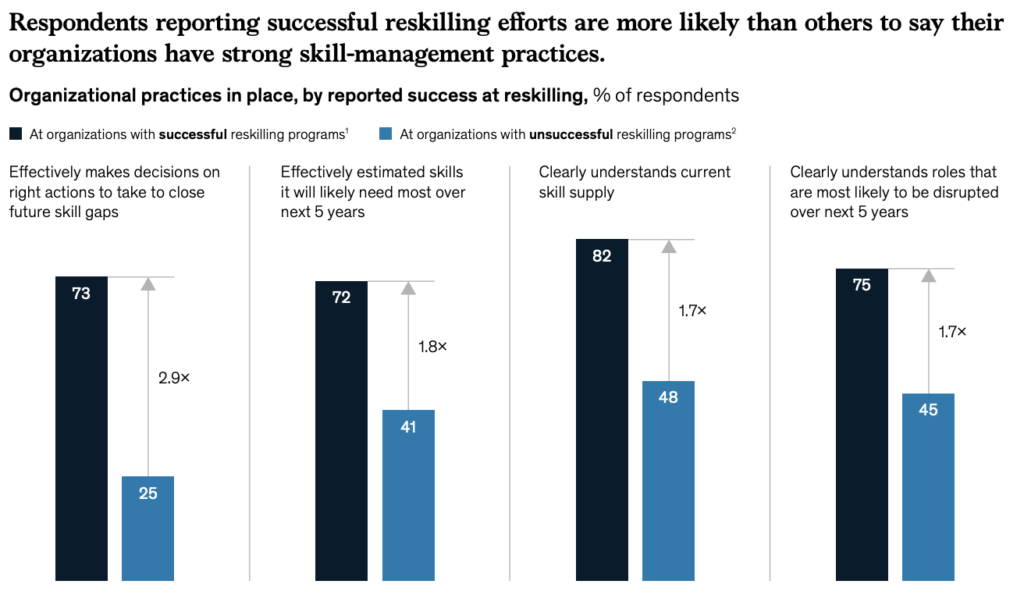
You should always track, measure, and compare agents’ performance relative to how they measured in the selection process, as well as before and after your training efforts. For example, if they performed well on a pre-employment assessment, you should continue measuring their progress in that area, as well as their ability to improve. If you’re unsure of the quality or impact of a certain training program, test it with a small group and see how their results change afterward.
A closing thought
If you want to close your talent gaps and upskill your existing and potential workforce, you need to know where and how to look for the skills that you need. However, your efforts need to go beyond hiring to focus on offering BPO employees the best training and development opportunities possible.
Be strategic about planning your workforce needs and about developing your current employees. Combining effective sourcing and recruiting with learning, reskilling and upskilling your existing workforce will help you effectively close talent gaps, navigate unprecedented times like those we’ve seen during the COVID-19 pandemic, and move your BPO or contact center forward in the months and years ahead.
- White paper
Before you continue!
Don’t forget to grab your free copy of our white paper on contact center volume hiring in 2021. Learn about:
-
The challenges currently shaping the contact e
center recruitment space - How employers can navigate the new remote-first reality, and the role of technology in a future-proof recruitment process
- The four building blocks of a fully digital recruitment process


